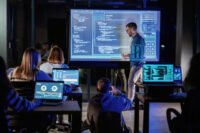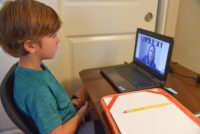From avatar-based simulation training to on-demand learning, teacher training institutes in the UAE are resorting to creative ideas and new digital tools to enable educational institutions to develop a smart, evolutionary generation of teachers
Dubai, Sept 30, 2021: Educators across the UAE have faced sweeping changes to teaching as a result of COVID-19. The sudden demand to move online to connect with students and support them through remote learning prompted an urgent need to revolutionise teacher training.
Schools in the UAE have been quick enough to respond to the demand by way of upskilling teachers and helping them prepare for return to school and beyond.
Teacher training institutes have rebuilt their programmes to keep pace with the rapid changes. From avatar-based simulation training to on-demand learning and use of e-learning as a tool, teacher training is seeing massive changes.
As the pandemic has highlighted the need to advance training to accommodate a variety of instructional environments simultaneously, teacher training Institutes are taking a holistic approach so teachers could evolve their practice to accommodate more sustainable teaching methods. “It became more about developing practice appropriate for those environments, which we consider to be professional development rather than quickly learning to use the digital tools to deliver the curriculum,” says Deborah Hennigan, Vice President of Operations at TELLAL Institute.
TELLAL also focuses on providing teachers with support around digital tools, platforms and environments that are mapped to specific learning features, such as how to have online discussions and how to manage group work.
Blended learning is the future
Post pandemic, training institutes are reshaping their strategies to incorporate a blended learning approach as opposed to just in-person or virtual training. “In-person training allows us to work more closely with the learners in real time and trainers can assess the needs of the room more effectively in person than through the screen. However, digital training allows learners the flexibility to interact with tutors at their own pace from any part of the world. We will continue to offer both in-person and online learning for our learners’ convenience,” says Dr. Vandana Gandhi, Founder and CEO, British Orchard Training Centre.
While blended learning is touted as the future of the technology-assisted classroom, the debate on the effectiveness of virtual vs in-person training continues. “It’s not possible to say unequivocally one is more impactful than the other…as it is also about learners’ readiness and their learning needs. The emphasis is then on teachers and schools making the right professional development choices for themselves to meet their (individual) needs,” adds Hennigan.
Teacher training schools agree that in order to achieve better learning outcomes, it is important to adapt and localize to suit the learning context. Hennigan says that it is imperative to have continuous innovation and accommodation in the training modules rather than sticking with a ‘one size fits all approach’.
New modes, new tools
Be it introduction of new digital tools or moving the programmes online, UAE-based training institutes have adapted to the change with ease.
The British Orchard Training Centre, for instance, was quick in transitioning its teacher training diplomas and professional development series online and in turn gained from a wider global audience. “During the pandemic we also implemented and trained our practitioners in multiple digital tools and applications such as Class Dojo, See Saw, iMovie, Zoom and Microsoft Teams in order to support distance learning,” says Dr. Gandhi.
TELLAL Institute on the other hand focused on recalibrating its existing tools and developing appropriate digital citizenship for all its stakeholders to support the online move. “Our mixed reality avatar-based simulation training was usually delivered as an in-class, live, fishbowl type session with a facilitator or coach working with teachers to develop their classroom practice. Now we deliver it via zoom and the facilitator is also an avatar so teachers can access any time they schedule in small groups or big groups and the simulation scenarios and avatar environments have changed to accommodate the changes in the instructional setting,” says Hennigan.
On-demand learning
Training modules are being restructured to accommodate a more ‘Netflix’ type approach to offer on-demand learning. The objective is to make sure that teachers know what they need and make their own decisions about the ‘what, where and when’ of their professional development.
“This is a much more of a learner-centered approach and allows teachers to make their own decisions and take responsibility for their own learning,” says Hennigan.
TELLAL Institute offers ways for teachers to self-assess or get a 360-degree view of their current practice so they can identify their next learning steps themselves. “Teachers do not have a lot of time to dedicate to professional learning, so it must cater to what they need and that they can see immediate value in it. This is really andragogy in action,” adds Hennigan.
Teachers are wanting to move away from structured, scheduled courses that are facilitator dependent to flexible, online training that puts them in the centre of action. As ways in which we learn and educate evolves constantly, teacher training institutes are resorting to creative ideas, new tech platforms and digital tools to enable educational institutions to have a smart, evolutionary generation of teachers who call the shots themselves.








